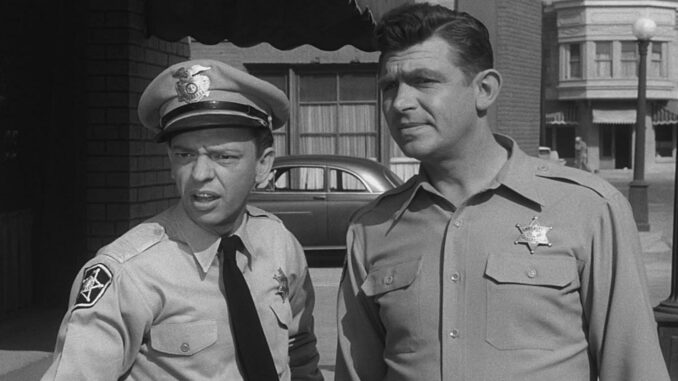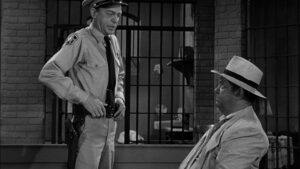
When fans think of The Andy Griffith Show, they often recall the charm, wit, and warmth that made Mayberry a timeless television escape. At the heart of this beloved series was Andy Griffith, who was determined to keep the show’s humor clean, clever, and authentic. Unlike many comedies that rely on cheap laughs, Griffith made it his mission to steer clear of lowbrow jokes that he felt would compromise the quality of the show. But what drove him to fight so hard against bad jokes? And how did his determination shape the legendary series?
Let’s dive into the story of Andy Griffith’s crusade to uphold the comedic integrity of The Andy Griffith Show, revealing the passion and purpose that made Mayberry not just funny but also endearing to generations of fans.
Why Andy Griffith Fought Against Bad Jokes
1. The Essence of Mayberry: Keeping It Clean and Clever
For Andy Griffith, humor was an art that required sincerity and skill. The humor of Mayberry wasn’t about flashy punchlines or slapstick antics; it was about genuine moments and heartfelt laughs. Griffith wanted the show to reflect a unique kind of humor that was clean, clever, and relatable. This meant rejecting jokes that felt too cheap or obvious, something he believed would diminish the show’s special quality.
2. A Personal Mission for Authentic Comedy
Griffith was passionate about comedy with depth. He believed humor should resonate with truth, not just rely on easy laughs. By maintaining this standard, Griffith hoped to make the humor on the show feel like a natural part of life in Mayberry, bringing a sense of authenticity that would appeal to a broad audience.
Andy’s Battle with the Writers
3. Setting Boundaries with the Writing Team
Writers often tried to inject quick, easy laughs into the script, hoping to make scenes pop. However, Griffith set boundaries from the start, ensuring that humor in The Andy Griffith Show wouldn’t be achieved at the expense of taste. He challenged his team to think beyond basic gags, instead creating situations that led to genuinely funny moments.
4. Collaborating for Quality
Instead of merely rejecting jokes, Griffith worked closely with the writers to fine-tune scripts. His approach was collaborative, encouraging writers to craft scenes that would highlight the unique quirks of each character without needing to resort to overused punchlines or forced humor.
How Griffith’s Standards Shaped the Show

5. Elevating the Role of Situational Comedy
Griffith understood that situational comedy could create laughs as powerful as any scripted joke. By focusing on the dynamics between characters, he ensured that humor emerged organically. This approach led to memorable interactions that fans still cherish, such as Barney’s overzealous attempts at enforcing the law or Aunt Bee’s earnest cooking blunders.
6. Highlighting Character-Driven Humor
Rather than inserting jokes for quick laughs, Griffith believed that humor should stem from the personalities of characters like Barney, Opie, or Aunt Bee. This character-driven humor allowed each cast member’s personality to shine through, making Mayberry feel real and relatable.
Notable Episodes Where Andy’s Standards Were Clear
7. The High-Quality Laughs of “The Pickle Story”
One standout episode, “The Pickle Story,” showcases Griffith’s commitment to quality humor. The episode revolves around Aunt Bee’s infamous pickles, which no one can bear to eat. The humor isn’t in cheap jokes but in the genuine reactions of the characters, leading to a hilarious yet wholesome episode.
8. “Man in a Hurry”: A Lesson in Mayberry’s Patience and Wit
In “Man in a Hurry,” Griffith’s comedic vision is clear. This episode finds humor in the clash between a big-city businessman and Mayberry’s slower pace. The laughs come from situational irony and character interactions, not from one-liners or gags, reinforcing Griffith’s belief in meaningful humor.
Challenges Andy Faced in Maintaining Comedic Integrity
9. Pushback from Network Executives
Network executives sometimes wanted more overt humor to boost ratings, but Griffith held firm in his vision. He resisted pressure to make the humor more exaggerated, keeping the show’s tone grounded and relatable. His commitment ultimately paid off as the show resonated with audiences without compromising its integrity.
10. Balancing Family-Friendly with Engaging Humor
Creating a show that was both family-friendly and genuinely funny wasn’t easy. Griffith was often faced with the challenge of striking a balance between maintaining wholesomeness and keeping viewers engaged. His dedication to this balance is what made The Andy Griffith Show unique in the world of television comedy.
The Cast’s Reaction to Andy’s Standards
11. Don Knotts: A Shared Vision for Clean Comedy
Don Knotts, who played Barney Fife, shared Griffith’s approach to humor. Knotts’ comedic style relied on physical and situational comedy, which fit well within Griffith’s vision for the show. Their collaboration led to some of the most memorable moments in the series, proving that comedy didn’t need to be crass to be effective.
12. Ron Howard’s Early Lessons in Quality Humor
As a child actor, Ron Howard learned a lot from Griffith’s standards. Playing Opie, he witnessed first-hand the dedication Griffith put into maintaining high-quality humor. This influence had a lasting impact on Howard’s approach to filmmaking, as he would later apply similar principles in his own career.
Audience Appreciation for Griffith’s Efforts
13. Building a Loyal Fanbase Through Meaningful Comedy
Fans of The Andy Griffith Show have long praised its unique humor, which feels like a breath of fresh air compared to many other sitcoms. By standing against bad jokes, Griffith built a loyal fanbase who appreciated his efforts to maintain a higher standard of comedy.
14. The Timeless Appeal of Mayberry’s Humor
Griffith’s commitment to quality humor has given the show a timeless appeal. Generations of fans continue to enjoy its episodes, finding the laughs as genuine and enjoyable as ever. The humor resonates because it’s grounded in real situations and characters, proving Griffith’s approach was the right one.
The Legacy of Andy Griffith’s Comedic Vision
15. How Andy Griffith’s Standards Influence TV Today
Andy Griffith’s fight against bad jokes left a lasting legacy in television. Today, his approach to humor—prioritizing character-driven, situational comedy—continues to influence modern sitcoms. Many shows aim to emulate the balance of heart and humor that Griffith so successfully captured in The Andy Griffith Show.
Conclusion
Andy Griffith’s battle against bad jokes on The Andy Griffith Show was more than just a personal preference; it was a commitment to preserving the essence of what made Mayberry a special place. By rejecting easy laughs and embracing quality humor, Griffith created a show that transcends time, appealing to audiences of all ages. His standards didn’t just create funny moments—they created meaningful, lasting entertainment. Griffith’s legacy reminds us that humor grounded in truth, character, and sincerity can captivate audiences without ever compromising on quality.
FAQs
1. Why did Andy Griffith fight against bad jokes?
Andy Griffith believed in creating humor that was genuine and character-driven, rejecting cheap jokes that he felt would diminish the show’s quality and charm.
2. How did Griffith’s approach to comedy influence the writers?
Griffith collaborated with the writers, encouraging them to focus on situational and character-driven humor instead of relying on quick gags.
3. Did other cast members support Griffith’s standards for humor?
Yes, particularly Don Knotts, who shared Griffith’s vision for clean comedy. Their partnership helped define the show’s unique brand of humor.
4. What impact did Griffith’s standards have on the show’s success?
Griffith’s commitment to quality humor gave the show a timeless appeal, earning it a loyal fanbase and ensuring its popularity across generations.
5. How is The Andy Griffith Show different from other sitcoms of its time?
Unlike many sitcoms that relied on slapstick or lowbrow humor, The Andy Griffith Show emphasized situational and character-driven comedy, making it unique in the TV landscape.